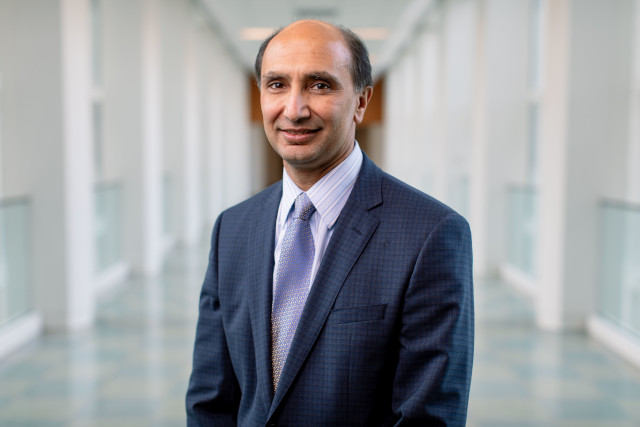RamaOnHealthcare April 1, 2025
Mayo Clinic’s Strategic Priorities for Research

Dr. Vijay Shah, Kinney Executive Dean of Research, Mayo Clinic
RamaOnHealthcare (ROH): How is Mayo Clinic Research evolving to meet new challenges?
Vijay Shah (VS): Aligned with Mayo Clinic’s 2030 Bold. Forward. strategy, we will Cure, Connect, and Transform to reshape the future of healthcare.
…we will Cure, Connect, and Transform to reshape the future of healthcare.
- By integrating data intelligence into our robust discovery science capabilities, we aim to accelerate the discovery and translation of groundbreaking treatments and cures.
- We will connect clinicians, scientists, and patients with new data insights—leveraging clinical trials and AI-driven approaches to intercept serious and complex diseases.
- We will transform how we work—driving innovation and partnerships that amplify our impact across healthcare.
Through AI and advanced digital platforms, we are embedding data intelligence into every facet of biomedical research, accelerating the journey from bench to bedside and delivering life-changing treatments to patients faster than ever.
For example, integrating spatialomics with the longitudinal patient record can allow powerful simulations of how gene transcription in diseased tissue drives patient outcome.
ROH: How is Mayo Clinic revolutionizing research to accelerate breakthroughs and transform patient care?
VS: At Mayo Clinic, we’re using advanced technology and digital platforms in ways that once seemed impossible to accelerate the discovery of cures. We’re transforming research through key initiatives designed to enhance data accessibility, accelerate discoveries, and bring new cures to people faster than ever before.
Our focus is on data intelligence, pioneering science, and clinical impact. By building a robust data resource, creating powerful new tools for researchers and clinicians, and ensuring rapid translation of discoveries to patients, we are transforming the way medical breakthroughs happen.
It all starts with data. By creating a comprehensive biospecimen and data resource, we are making it easier for researchers to access critical materials while ensuring the highest standards of privacy, compliance, and ethical use. Additionally, a unified data platform is also being developed to integrate genomic, imaging, and clinical datasets, giving researchers a powerful tool to drive new discoveries and collaborations.
A major focus of our research transformation is Precure, an initiative designed to predict and prevent disease before it becomes serious. By leveraging AI-driven predictive analytics, robust data resources, and clinical decision support tools, Precure aims to identify early disease markers and enable proactive interventions. For example, longitudinal voice recordings may allow us to predict progression of mild cognitive impairment.
A major focus of our research transformation is Precure, an initiative designed to predict and prevent disease before it becomes serious.
We are also advancing bioengineered and bioartificial solutions to tackle critical medical challenges, including alternatives to traditional organ transplants. By harnessing cutting-edge technology and collaborative partnerships, we aim to accelerate the development of next-generation regenerative medicine and cellular engineering solutions.
Finally, we are streamlining the translation of research into real-world patient care. By improving the efficiency of clinical trials and integrating AI-powered decision-making tools, we are reducing the time required to bring new treatments from the lab to clinical practice. These advancements will ensure that patients benefit from scientific advancements faster than ever.
Finally, we are streamlining the translation of research into real-world patient care.
ROH: What foundational changes are being made to support this transformation?
VS: To make this transformation a reality, we need all elements working together seamlessly—people, processes, partnerships, and technology. We will synergize these elements to support accelerated research, reduce administrative burden, and increase collaboration across the organization. To drive this transformation, we will:
- Leverage AI and automation to optimize research and streamline processes.
- Enhance workforce development by equipping our teams with AI and automation training to maximize their ability to leverage new technologies.
- Form strategic industry and academic partnerships to co-develop novel therapeutics, advance clinical trials, and create an ecosystem for breakthrough technologies.
This transformation is bold, ambitious, and essential. As we look ahead to 2030, we’re not just working to bring cures to patients faster—we’re reshaping the future of healthcare itself.
As we look ahead to 2030, we’re not just working to bring cures to patients faster—we’re reshaping the future of healthcare itself.
About Dr. Vijay Shah
In 2024, Mayo Clinic appointed Vijay Shah, M.D., as the new Kinney Executive Dean of Research. He served as chair of the Department of Internal Medicine at Mayo Clinic’s Minnesota campus in Rochester, Minnesota. He is a professor of medicine and physiology at Mayo Clinic College of Medicine and Science and is the Mayo Clinic-endowed Carol M. Gatton Professor of Digestive Diseases Research.
Dr. Shah has maintained a National Institutes of Health (NIH)-funded program at Mayo Clinic for more than 20 years, which focuses broadly on alcohol-related liver disease, cirrhosis, portal hypertension and its complications with over 200 peer-review publications in distinguished journals such as the Journal of Clinical Investigation, Nature, Proceedings of the National Academy of Sciences, New England Journal of Medicine and others. Dr. Shah is a member of the prestigious American Society for Clinical Investigation and the Association of American Physicians (AAP).





